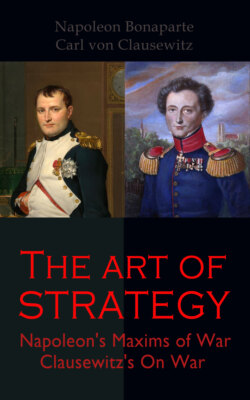Читать книгу The Art of Strategy: Napoleon's Maxims of War + Clausewitz's On War - Carl von Clausewitz - Страница 94
На сайте Литреса книга снята с продажи.
3. UTMOST USE OF FORCE.
ОглавлениеNow, philanthropists may easily imagine there is a skilful method of disarming and overcoming an enemy without great bloodshed, and that this is the proper tendency of the Art of War. However plausible this may appear, still it is an error which must be extirpated; for in such dangerous things as War, the errors which proceed from a spirit of benevolence are the worst. As the use of physical power to the utmost extent by no means excludes the co-operation of the intelligence, it follows that he who uses force unsparingly, without reference to the bloodshed involved, must obtain a superiority if his adversary uses less vigour in its application. The former then dictates the law to the latter, and both proceed to extremities to which the only limitations are those imposed by the amount of counter-acting force on each side.
This is the way in which the matter must be viewed and it is to no purpose, it is even against one’s own interest, to turn away from the consideration of the real nature of the affair because the horror of its elements excites repugnance.
If the Wars of civilised people are less cruel and destructive than those of savages, the difference arises from the social condition both of States in themselves and in their relations to each other. Out of this social condition and its relations War arises, and by it War is subjected to conditions, is controlled and modified. But these things do not belong to War itself; they are only given conditions; and to introduce into the philosophy of War itself a principle of moderation would be an absurdity.
Two motives lead men to War: instinctive hostility and hostile intention. In our definition of War, we have chosen as its characteristic the latter of these elements, because it is the most general. It is impossible to conceive the passion of hatred of the wildest description, bordering on mere instinct, without combining with it the idea of a hostile intention. On the other hand, hostile intentions may often exist without being accompanied by any, or at all events by any extreme, hostility of feeling. Amongst savages views emanating from the feelings, amongst civilised nations those emanating from the understanding, have the predominance; but this difference arises from attendant circumstances, existing institutions, &c., and, therefore, is not to be found necessarily in all cases, although it prevails in the majority. In short, even the most civilised nations may burn with passionate hatred of each other.
We may see from this what a fallacy it would be to refer the War of a civilised nation entirely to an intelligent act on the part of the Government, and to imagine it as continually freeing itself more and more from all feeling of passion in such a way that at last the physical masses of combatants would no longer be required; in reality, their mere relations would suffice—a kind of algebraic action.
Theory was beginning to drift in this direction until the facts of the last War 4 taught it better. If War is an act of force, it belongs necessarily also to the feelings. If it does not originate in the feelings, it reacts, more or less, upon them, and the extent of this reaction depends not on the degree of civilisation, but upon the importance and duration of the interests involved.
Therefore, if we find civilised nations do not put their prisoners to death, do not devastate towns and countries, this is because their intelligence exercises greater influence on their mode of carrying on War, and has taught them more effectual means of applying force than these rude acts of mere instinct. The invention of gunpowder, the constant progress of improvements in the construction of firearms, are sufficient proofs that the tendency to destroy the adversary which lies at the bottom of the conception of War is in no way changed or modified through the progress of civilisation.
We therefore repeat our proposition, that War is an act of violence pushed to its utmost bounds; as one side dictates the law to the other, there arises a sort of reciprocal action, which logically must lead to an extreme. This is the first reciprocal action, and the first extreme with which we meet (first reciprocal action).
